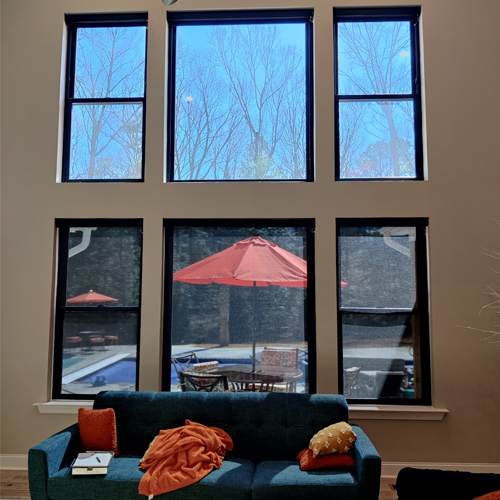Why Residential Window Tint is Perfect for Home Offices and Research Studies
Wiki Article
Exactly How Residential Window Tinting Enhances Your Home's Power Effectiveness
Residential window tinting offers a compelling remedy for property owners looking for to improve energy effectiveness within their living spaces. By applying specialized movies to windows, it properly decreases warmth transfer, thus maintaining indoor temperature levels and reducing the demand for excessive heating or cooling. This not only stops energy intake but likewise gives an extra comfy environment by alleviating glare. However, understanding the nuances of just how tinting works and selecting the appropriate kind for your home can be crucial. Oddly, what factors should one think about prior to making this financial investment?Recognizing Home Window Tinting
Understanding window tinting is necessary for home owners looking for to boost both convenience and power efficiency in their space. Residential Window Tint. Window tinting involves the application of a thin movie to the interior or exterior surface of glass windows. This film can significantly modulate the amount of sunlight and heat that enters a home, thus affecting interior environment problemsThere are numerous sorts of window tinting films available, each with unique buildings. Dyed films take in solar power, while reflective films disperse it away from the glass surface. Ceramic films supply an equilibrium of exposure and warmth denial, making them a preferred option among homeowners. The performance of window tinting is typically measured by its Visible Light Transmission (VLT) percent, which suggests just how much light can go through the film.
Benefits of Power Effectiveness
Window tinting not just improves visual appeals yet likewise plays a considerable role in boosting energy effectiveness within domestic rooms. By minimizing heat transfer with home windows, tinted movies produce a more steady interior climate, which can bring about significant reductions in power consumption for heating and air conditioning. This energy efficiency equates right into reduced utility bills, offering home owners with substantial long-lasting financial savings.
In addition, window tinting enhances the comfort of living rooms. By decreasing glow and blocking harmful UV rays, colored windows produce a more positive atmosphere, which can result in boosted health for owners. The security against UV rays likewise helps maintain furniture and flooring from fading, adding to the durability of household products.
How Tinting Functions
Tinting movies operate with a combination of sophisticated materials and technologies designed to manage the quantity of solar energy getting in a home. Mainly composed of polyester, these movies typically include ceramic or metal particles that reflect and soak up warmth. This dual capacity enables them to significantly minimize the penetration of ultraviolet (UV) rays and infrared radiation my response while permitting noticeable light to pass through.The performance of window tinting is determined by its solar warmth gain coefficient (SHGC), which indicates just how much solar power is sent via the home window. Reduced SHGC worths are more suitable as they represent greater heat being rejected. In addition, window tints can include a selection of tones, allowing house owners to tailor their aesthetic official website preferences while improving power effectiveness.
Moreover, these movies work as a barrier, avoiding warm loss throughout cooler months by mirroring interior warmth back right into the home. This thermal insulation impact matches the air conditioning advantages obtained during warmer months, adding to a well balanced interior environment year-round. By taking care of solar power efficiently, household home window tinting not just boosts convenience yet additionally plays an important duty in reducing power intake and decreasing utility costs.
Picking the Right Color

There are numerous types of window movies available, consisting of colored, metalized, and ceramic. Dyed films are affordable however might have limited longevity. Metalized films supply better warm denial but can disrupt electronic signals. Ceramic films give excellent warm control without endangering presence and are very resilient, making them a prominent selection.
Noticeable light transmission (VLT) is an additional essential element, as it suggests the quantity of all-natural light that can travel through the tinted glass. House owners need to pick a color with over at this website a VLT that enhances their lights preferences while still supplying appropriate glow reduction.
Furthermore, evaluating the solar warm gain coefficient (SHGC) can aid establish just how well a color can obstruct warm from sunlight. A reduced SHGC suggests much better warm control, eventually improving energy performance.
Installation and Upkeep Tips
Proper installment and maintenance are vital parts in taking full advantage of the advantages of household window tinting. Specialists also use specialized devices and strategies, which can boost the resilience and performance of the tint.Complying with installation, maintenance is important to prolong the life of the home window movie. It is suggested to wait at the very least thirty day prior to cleaning up the colored home windows to allow the sticky to treat totally. When cleaning, make use of a soft towel and a gentle, ammonia-free cleaner to avoid damaging the movie. Stay clear of rough products that could scratch the surface.
Dealing with these issues promptly can stop more damages and preserve energy performance. By sticking to these setup and maintenance suggestions, homeowners can guarantee their home window tinting continues to provide substantial energy cost savings and comfort for years to come.
Verdict
In final thought, property window tinting offers as an effective option for enhancing power performance within homes. By lowering warm transfer and obstructing damaging UV rays, home window films contribute to decrease energy consumption and enhanced interior convenience.Window tinting includes the application of a slim film to the interior or exterior surface area of glass home windows. By decreasing warm transfer via home windows, colored films produce a much more secure interior climate, which can lead to substantial reductions in power intake for heating and cooling.The efficiency of window tinting is determined by its solar warmth gain coefficient (SHGC), which shows how much solar energy is transmitted with the home window. By managing solar energy efficiently, property home window tinting not just boosts convenience yet also plays an important function in minimizing energy usage and reducing energy costs.
By lowering warmth transfer and obstructing harmful UV rays, window movies add to decrease power intake and boosted interior convenience.
Report this wiki page